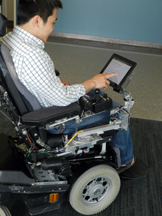Assistive wheelchair tray could help people with disabilities use iPads, other mobile devices more easily
August 15, 2013
 |
|
Alexander Lo, a researcher in the Purdue Center for Paralysis Research, uses an iPad on the RoboDesk. The RoboDesk is an assistive technology being developed at Purdue University to help people with disabilities use iPads and other mobile devices more easily. (Purdue Research Foundation photo) |
WEST LAFAYETTE, Ind. – "RoboDesk," a motorized wheelchair tray, could provide people with disabilities with an efficient and easy-to-use method to more easily position and remove an iPad or other mobile devices without being limited by a table or moving in and out of the chair.
Brad Duerstock, a Purdue University associate professor of engineering practice in the Weldon School of Biomedical Engineering and School of Industrial Engineering, is developing the technology and other assistance technologies in the Purdue Institute for Accessible Science.
"Our primary goal is to foster independence and improve quality of life, and one area that is a challenge that I've had and what I have witnessed other people having is easy access to using mobile devices like iPads and smartphones," said Duerstock, director of the Purdue institute and a quadriplegic. "Right now wheelchair users, especially those with upper limb mobility limitations, do not have an easy way to place a mobile device in their lap and then retract the device when not in use. The RoboDesk does that."
The RoboDesk uses a motorized mount on a wheelchair that utilizes an arm to deploy or retract a mobile electronic device such as a tablet or lightweight notebook. The assistive tray's multifunctional design enables it to be used for other purposes, as well, such as a writing surface or meal tray. The mount for the RoboDesk does not exceed the width of a wheelchair, which is important to users because it does not impede their ability to maneuver through doorways.
"We've designed the RoboDesk so it does not affect a wheelchair's normal seat functions such as tilting, reclining or elevating, and it does not inhibit the user's ability to transfer in and out of a wheelchair," Duerstock said. "It is extremely versatile."
Duerstock is working to make the RoboDesk compatible with various types of manual and electric or battery-operated wheelchairs.
 |
|
Brad Duerstock, a Purdue University associate professor of engineering practice in the Weldon School of Biomedical Engineering and School of Industrial Engineering, is developing the technology and other assistance technologies in the Purdue Institute for Accessible Science. (Purdue Research Foundation photo) |
"My goal is to get the RoboDesk licensed and manufactured within the next three years," he said.
Duerstock has a second goal as well and that is to encourage more people with disabilities to pursue higher education, particularly in the sciences.
"Only 2 percent of people working in the sciences age 35 or younger have a disability; however, people with disabilities represent 10.4 percent of the overall U.S. workforce," Duerstock said. "I believe we are losing a lot of talented people who could make a difference if they're given the tools and opportunities to succeed. I want to make it easier for them to actively participate in their educational endeavors."
Karl Booksh, a professor of chemistry and biochemistry at the University of Delaware, agreed.
"Innovations like the RoboDesk are really essential for getting people with mobility loss into the lab with more tools at their disposal so they can do what they want to do," said Booksh. "It can help level the playing field for students and researchers."
A 2011 National Science Foundation study showed that more than 300 people with disabilities earned their doctorate degrees in science and engineering fields in 2008.
The RoboDesk and Purdue University's other patented technologies include new cancer treatments, alternative fuels, biomedical devices and crop improvement, and are available for licensing through the Office of Technology Commercialization. For more information, call 765-588-3475, email otcip@prf.org or visit http://otc-prf.org/available-technologies.
About the Purdue Institute for Accessible Science
The Purdue Institute for Accessible Science (pdf) was established with a $2 million grant from the National Institutes of Health Director's Pathfinder Award in October 2010 and operates out of the Hall of Discovery and Learning Research in Purdue's Discovery Park. It was one of six such research centers funded as part of the NIH Director's ARRA Pathfinder Award to Promote Diversity in the Scientific Workforce.
Contact: Cynthia Sequin, 765-588-3340, casequin@prf.org
Sources: Bradley S. Duerstock, 765-496-2364, bsd@purdue.edu
Karl Booksh, 302-831-2561, kbooksh@udel.edu
Video: A video about the RoboDesk can be viewed at http://youtu.be/GehfR-exObc

